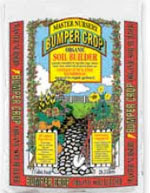Not long ago it was the Summer Solstice, which means that here in the Northern Hemisphere, the days are getting shorter. It is very difficult to think about fall crops when you're still busy weeding your onions, trellising tomatoes and dealing with sizzling summer heat, but take a break today to prepare for the autumn months. Here are some suggestions for fall crops that can be grown from seed! Carrots, beets, broccoli, broccoli di rapa, brussel sprouts, cabbage, cauliflower, collards, kale, kohlrabi, peas, swiss chard, spinach and lettuces to name a few! A good portion of the United States has conditions favorable for fantastic fall vegetable gardens. You just need to plan ahead and start seeds now (or very soon). It is also very helpful for Fall Gardening to know when your frost dates are.
https://www.almanac.com/gardening/frostdates
Before sowing these second crops, turn over the soil and mix in some balanced organic fertilizer/soil conditioner such as Bumper Crop to replace what earlier plants have used up. Left-over debris like stems or roots from the first planting can cause problems in seed germination if they aren't removed or allowed to break down, so wait a week or two before seeding the second crop, or be sure to remove this material as completely as possible. |
 |
The next thing to consider is, how long does it take for the particular crop to mature? (This info can usually be found on the back of the seed packets). Some crops mature in 30 days ie. leafy crops such as lettuces, spinach, beans, kale, Swiss chard, peas, chives and even some herbs such as basil, chives, oregano, parsley, thyme. Then there are the crops that mature in approximately 60 days such as early carrots, leeks, turnips and some varieties of cabbage. Finally the crops that mature in approximately 90 days that should be planted right about now such as brussel sprouts, broccoli and cauliflower and various varieties of cabbage. These are only a few examples and as always there are always varying exceptions in all gardening. |

